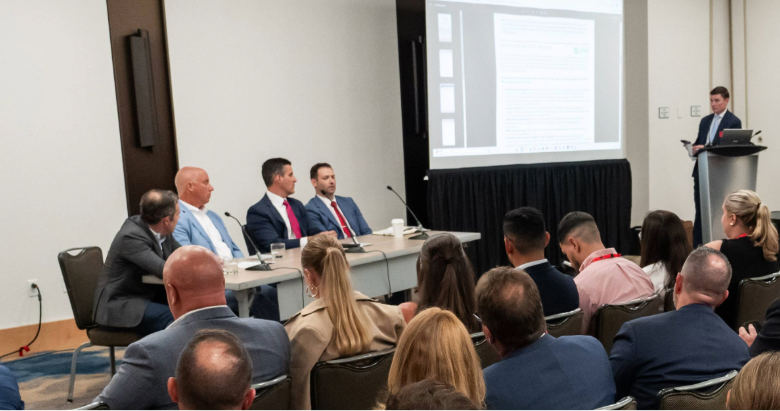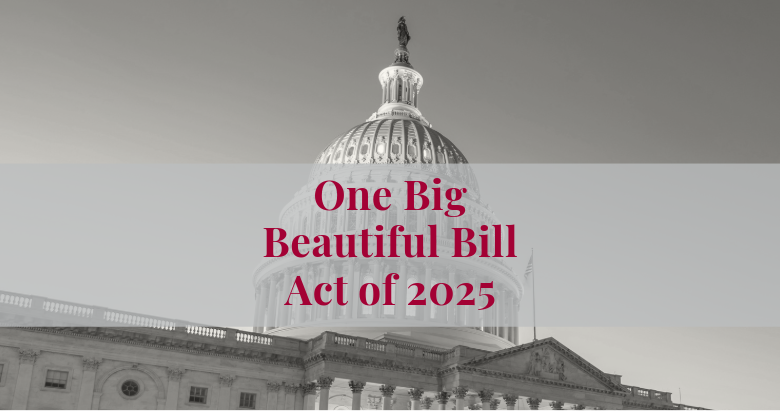The Big Beautiful Bill
On July 4, 2025, President Trump signed into law the ‘One Big Beautiful Bill Act (BBB)’ bringing into effect significant legislation passed by the House of Representatives on May 22 and subsequently modified and passed by the Senate. The House and Senate versions of the bill differed in key areas but both addressed major tax provisions impacting businesses and individuals alike. Some of these provisions are extensions of those from the 2017 Tax Cuts and Jobs Act (TCJA) while others are designed to address important issues raised by taxpayers.
Tax Implications
On June 24, our own Eric Seidman, partner at Wouch Maloney, was invited to participate in a panel addressing the tax implications of the BBB in Washington, D.C. Eric was joined by Curt Beaulieu, Senior Policy Advisor for House Speaker Mike Johnson; David Chapin, President, Willmar Electric; and Liam Donovan, Consultant, Targeted Victory.

Our staff is diligently reviewing the final language of this bill in order to provide the best possible advice and will be following up with deeper dives into specific components of the bill in future Wednesday Wisdom articles. However, today we will provide a broad overview on some of the more noteworthy and discussed aspects of the bill.
Bonus Depreciation: prior to this legislation, bonus depreciation allowed taxpayers to accelerate the expense by deducting 40% of the cost of eligible property placed in service in 2025 (down from 60% in 2024, 80% in 2023 and 100% in 2022). Under the BBB, bonus depreciation is reinstated to 100% for property acquired after January 19, 2025.
Section 179: this deduction allows taxpayers to expense 100% of the cost of eligible property but was subject to certain limitations as well as a cap on both the expense and the amount of total property placed into service. The bill increases the cap from $1 million to $2.5 million, with phase-outs beginning at $4 million of qualified property placed in service after December 31, 2024.
Estate Tax: the previous estate tax exemption was set to sunset. Now, under the BBB, the exemption is permanently increased to $15 million ($30 million for married couples) for gifts made after December 31, 2025. This amount will be adjusted for inflation annually.
State and Local Taxes (SALT): SALT were capped at $10,000 as part of Itemized Deductions on Schedule A of Form 1040. This bill increases the $10,000 cap to $40,000, adjusted annually for inflation, through 2029, after which it would revert to the previous cap without further legislation. This deduction is reduced for taxpayers with modified adjusted gross income > $500,000.
Section 199(A) – QBI: The Qualified Business Deduction (QBI) was a big boon for businesses in the TCJA as it allowed for a 20% deduction on income for qualified passthrough entities. The BBB makes this 20% deduction permanent. Note – the House version of the bill proposed an increase to 23% but the final legislation renders the existing 20% a permanent deduction.
Research & Development Expenditures: the bill allows Companies engaging in R&D activity to deduct qualified expenses in the years incurred. This is a big departure from the TCJA treatment, where these costs were required to be capitalized and amortized over a five-year term. The change is made retroactive to years beginning after December 31, 2021. Stay tuned as we will have much more to say about this change and the potential methods for relief that taxpayers can implement, be they the filing of amended returns or a change in accounting method application.
Tips & Overtime: the bill creates a new tax deduction for income from both tips and overtime. The deductions apply to those earning less than $150,000 ($300,000 for a joint return). The Tips deduction is capped at $25,000 while the Overtime deduction is capped at $12,500 ($25,000 for married filing jointly). Phaseouts of both occur at the above-mentioned income limits.
There are numerous other provisions in the bill that could impact your business or personal tax situation. The team at Wouch Maloney is vigorously digesting the legislation. Should you you have any questions or concerns, please call us at 215.675.8364 or email us today.
DISCLAIMER: All communications by Wouch, Maloney & Co., LLP intend to provide general information, as of the date of the communication, and may reference information from reputable sources. Although our firm has made every reasonable effort to ensure that the information provided is accurate, we make no warranties, expressed or implied, of the information provided. Please be aware that this is not a comprehensive analysis of the subject matter covered and is not intended to provide specific recommendations to you or your business with respect to the matters addressed.




